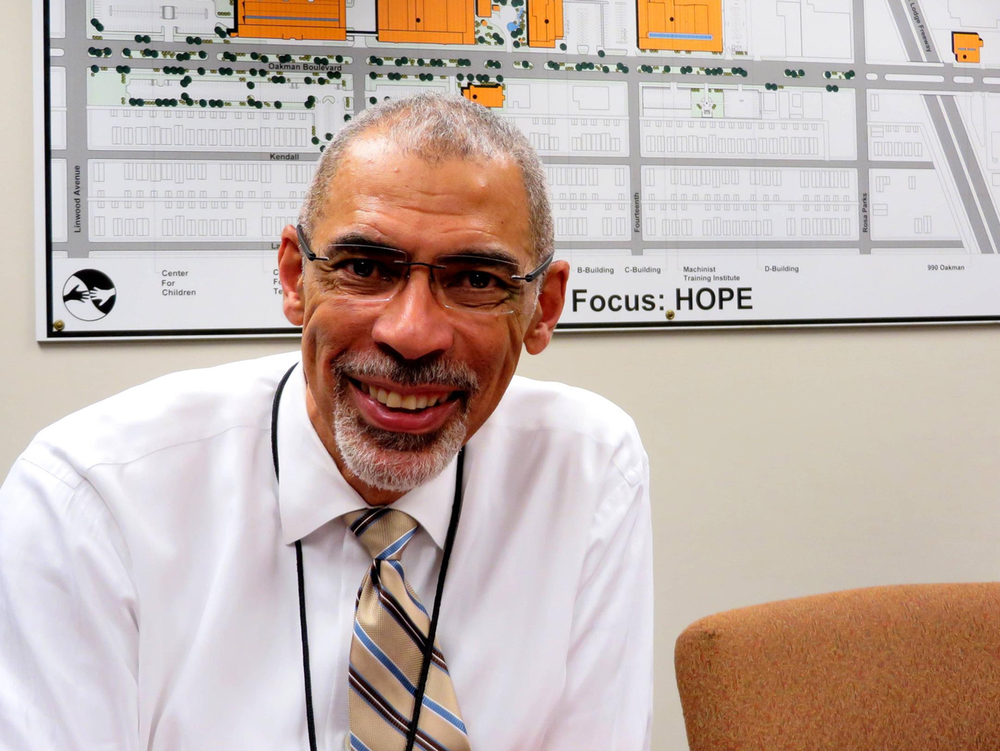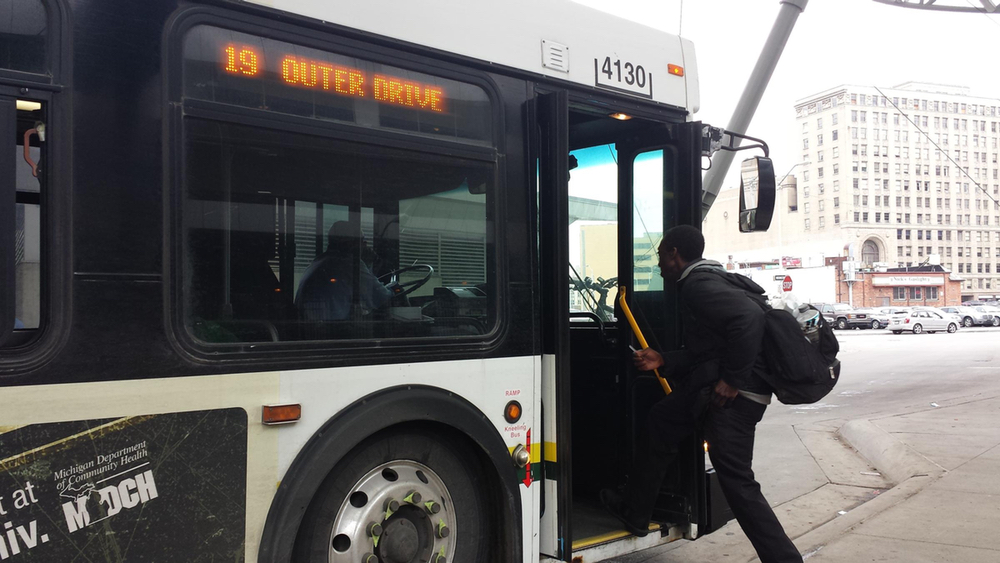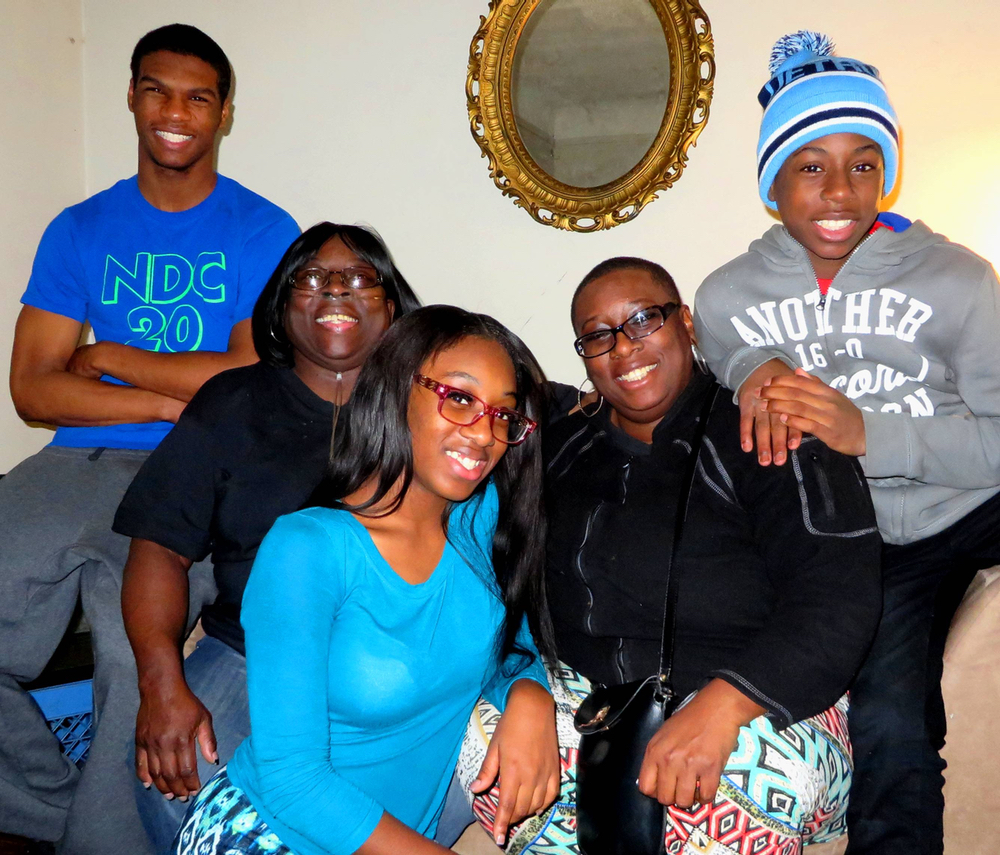For one Detroit mom, a complicated path to employment
The unemployment rate in Detroit is nearly double the statewide rate. Detroit residents need jobs. But too few people have marketable skills. What does it take to go from out-of-work to trained and employed?
For 30 years a group in Detroit has been training people to go to work as machinists, in IT, and beginning this year, in health care.
“When folks come out of here with that Focus: HOPE stamp of approval, you can be certain that you’re getting somebody who should work out pretty doggone well in your workplace,” said William Jones, CEO of Focus: HOPE.
But there’s a lot to learn before getting to the workplace. I sat with a class for a few moments watching as individual students were called up front to read a gauge. The instructor was coaxing and encouraging each student. “He has everything up, having found all the values and the reading is…”
Quietly, the student answered, “Three hundred and 58-thousandths of an inch.”
"Very good," the instructor said warmly. The entire class applauded.
This is critical stuff. When you have to measure a piece of metal being turned on a lathe or milled down for a part that has to be accurate down to a thousandth of an inch, you have to be able to use tools such as a micrometer caliper inch gauge machinist measuring tool.
Challenges from the start
Just being in this class puts these students ahead of the crowd. Depending on the class, only half to two-thirds of applicants are accepted – many fail the drug test. Only about 80 percent of the accepted applicants pass the entrance exam.
“Although they may have a high school diploma, many people are placing below 12th grade math and reading and in many cases are at fourth and fifth grade levels,” said Rashida Goudeaux, the Director of Workforce Development & Education at Focus: HOPE. “So, that seems to be a big challenge.”
Those who don’t make it, do have the option of basic courses to get up to speed.
Fatima Mixon is a student machinist who got through the entrance exam. She says there was still math waiting for her.
“They teach you, freshen you up on your math skills and make sure you got everything down pat. They make sure you know what you know...I’m very proud of the decision I made to come through.”
Most of these students pay little or nothing to take these classes. But getting through the application process and passing the entrance exam are just the first couple of hurdles for some Focus: HOPE students. Some are homeless. Some don’t have the appropriate clothes to go to class or to go on a job interview. Some need eyeglasses. Some don’t have a way to get to class. Focus: HOPE either helps directly or works with partners to get students what they need to live and get to class. The idea is you can’t successfully train someone when everything else in their life is working against them.
Fatima Mixon was given bus passes and transfers so she could make it to classes. In Detroit, even that’s something of an obstacle. The bus system is not always reliable.
“Basically, you have to do what you’ve got to do to get where you want to be. And, if that means you’ve got to leave out of the house an extra hour, hour-and-a-half early to do what you’re trying to accomplish, then that’s what you’ve got to do,” she says.
One woman’s journey
Mixon, 36, says she's determined to get that certificate to become a floor machinist. The machinist training is important, she says, but so are the soft skills. Students learn everything from how to properly shake hands, to working as a team, to getting through a job interview successfully.
“I’ve tried to go out here and just get a job. And usually it’s harder, especially if you don’t have too much work experience by me being sort of a stay-at-home mom. So I have a sketchy work history, but getting the training and, you know, going through the interview process, and they help you with all that type of stuff it helps. It helps,” Mixon said.
We decided to follow Mixon to see how it goes. A few weeks after I first met her at the school, I visited Mixon and her family at home.
It was just after a big snowstorm in Detroit. Mixon’s youngest, Makell, was shoveling snow outside and let me know I’d found the right place. I climbed the off-kilter concrete stoop to the house they rent.
Inside, Mixon’s daughter, Kyra, was curled up near a space heater. She’s in high school. That’s old enough to have opinions, right? I asked what she thought about her mom’s decision to take classes to help her get back into the workforce.
“I think it’s a good idea that she should do it and she will – I think she will get a job,” Kyra said enthusiastically.
Fatima Mixon hasn’t held a job for several years. She’s been a stay-at-home mom.
Her oldest child, Kevin, has a bit of a dry wit. When I asked the 19-year-old about his mom getting back into the workforce, he looked at her and smiled a little mischievously and said, “Finally.”
Everyone laughed.
“Finally. Yeah. It’d been awhile for her. I’m proud of her. She actually stuck to something and now she’s about to complete it," he then smiled again and looked at his mom. "I might ask her to borrow something to eat,” and he laughed again.
Daily hurdles
Kevin is working and attending Henry Ford Community College. He had been going to Notre Dame College on a football scholarship.
“But, we had some financial problems so I ended up having to come back home and go to Henry Ford,” he explained quietly.
It turns out playing football for the Fighting Irish didn’t cover everything.
Mixon says they didn’t realize that.
“Well, you know, the scholarship, you know, kind of messed up. It wasn’t a full scholarship and so when it came to our end to be able to pay, we couldn’t afford it. It was like $400 a month, you know. We couldn’t afford it," she said.
She would like to see Kevin eventually go to Wayne State University. She worries that if her son keeps working to support the family, it will make it difficult for him to get there. So, she wants to make enough to let him hit the books without the distraction.
When we visited that day, Mixon was getting close to finishing her classes at Focus: HOPE. She was hoping the training would mean a decent job soon.
“I’m putting a lot of applications everywhere. I’ve heard a few things back, but nothing really solid, so … hopefully real soon I’ll be working,” she said. She's upbeat. She seems optimistic.
In the meantime, she and her three kids are living with her mother.
Myra Mixon is 56. She’d been the primary wage earner for the family, but a couple of years ago she got COPD, a respiratory illness. She now relies on an oxygen tank.
“Although they may have a high school diploma, many people are placing below 12th grade math and reading and in many cases at fourth and fifth grade level. So, that seems to be a big challenge.” ‒ Rashida Goudeaux, Director of Workforce Development & Education at Focus: HOPE
“I’m now currently getting disability, but I use all my disability to pay for the rent,” Myra Mixon says. “And my grandson, he helps out. But when she gets a job, she’s going to take care of business. But, that’s what I do right now, just, I use all of it to take care of the house.”
Myra Mixon worked for a long time. She knows it takes some drive to keep going. She’s been gently nudging, encouraging Fatima to finish the training she needs to get back into the workforce.
“And I told her ‘Just keep your head up. It’s hard work, but you got to keep going. You got to keep going.’ I’m so proud of my daughter; I can’t put it into words,” she said.
Fatima Mixon knows the expectations of her kids, the expectations of her mother, the expectations she’s put on herself and meeting all of them will determine the future of the family. That's a lot.
“Yeah, I’m a little nervous, but I’ll be okay, " she laughed and continued, "I’m excited and nervous at the same time. It’s kind of mixed emotions I guess.”
Next week, we’ll visit with Fatima Mixon again, to see how that job search is going.
See what new members are saying about why they donated to Bridge Michigan:
- “In order for this information to be accurate and unbiased it must be underwritten by its readers, not by special interests.” - Larry S.
- “Not many other media sources report on the topics Bridge does.” - Susan B.
- “Your journalism is outstanding and rare these days.” - Mark S.
If you want to ensure the future of nonpartisan, nonprofit Michigan journalism, please become a member today. You, too, will be asked why you donated and maybe we'll feature your quote next time!


 Focus: HOPE CEO William Jones (Photo by Lester Graham)
Focus: HOPE CEO William Jones (Photo by Lester Graham) Focus: HOPE offers rows of mills and lathes for students to learn job skills. (Photo by Lester Graham)
Focus: HOPE offers rows of mills and lathes for students to learn job skills. (Photo by Lester Graham) Public transportation in Detroit is not always reliable for people holding jobs. (Photo by Lester Graham)
Public transportation in Detroit is not always reliable for people holding jobs. (Photo by Lester Graham) Fatima Mixon and the family that is counting on her job search. From left: son Kevin; mother Myra; daughter Kyra; Fatima, and son Makell. (Photo by Lester Graham)
Fatima Mixon and the family that is counting on her job search. From left: son Kevin; mother Myra; daughter Kyra; Fatima, and son Makell. (Photo by Lester Graham)